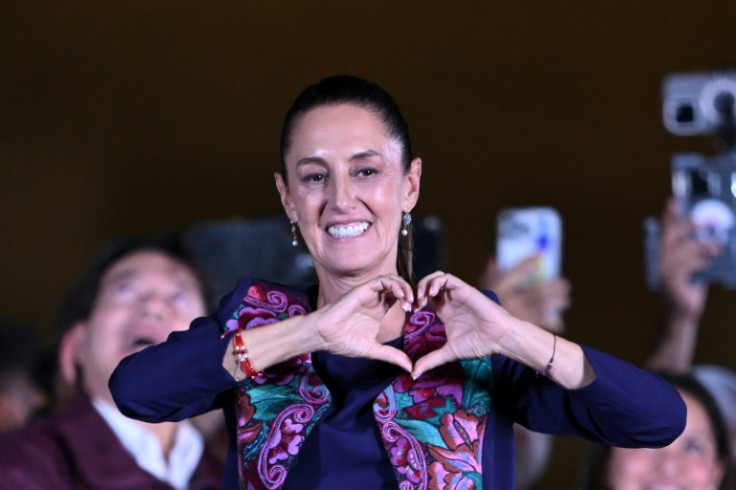
Mexican president-elect Claudia Sheinbaum's team reassured investors Tuesday that she would ensure the stability of Latin America's second-biggest economy, after her landslide election win rattled financial markets.
The country's stock market dropped six percent the day after Sunday's election as investors worried that the left-wing candidate's crushing victory would make it easier to push through reforms potentially damaging to the economy and business.
Sheinbaum's first cabinet appointment was asking Finance Minister Rogelio Ramirez de la O to stay on when she becomes Mexico's first woman president on October 1.
In a video published on social media, she pledged to "act with dialogue, harmony and great responsibility."
It was a message reinforced Tuesday by Ramirez de la O, who assured investors that the new government would be committed to "macroeconomic stability" and "fiscal prudence."
"Our project is based on financial discipline, respecting the autonomy of the (central) Bank of Mexico, adherence to the rule of law and facilitating national and foreign private investment," he said.
The stock market rebounded by more than three percent while the peso steadied after falling four percent against the dollar on Monday.
Sheinbaum, a former Mexico City mayor and key ruling party figure, won around 59 percent of the votes with more than 95 percent of ballots counted, according to the National Electoral Institute.
That was 31 percentage points ahead of her main opposition rival Xochitl Galvez, who won around 28 percent, after a particularly violent election season that saw more than two dozen local candidates murdered.
The ruling party and its allies were projected to win a two-thirds supermajority in the lower house of Congress -- and possibly the Senate as well.
Galvez, who conceded defeat after initial results were announced, complained Monday that the opposition had faced "unequal competition" in the election "against the entire state apparatus dedicated to favoring its candidate."
She expressed confidence in the official results but vowed to challenge the outcome, without specifying how, declaring: "This doesn't end here."
Outgoing President Andres Manuel Lopez Obrador defended the election won by his political protege as "the cleanest and freest election in history."
Sheinbaum owes much of her popularity to Lopez Obrador, a fellow leftist and mentor who has an approval rating of more than 60 percent but is only allowed to serve one term due to Mexico's presidential term limits.
His opponents accuse him of seeking to undermine Mexico's democratic institutions in his attempts to reform the justice system.
One of the proposed constitutional changes -- which require the approval of two-thirds of Congress -- is for Supreme Court judges to be chosen by popular vote.
With legislators expected to reconvene on September 1, Lopez Obrador could have time to pass some of his more controversial reforms before leaving office, the political risk consultancy EMPRA noted.
Lopez Obrador "will de facto remain as his party's political strategist" and "maintain a strong influence over Sheinbaum's government, at least during the first half of her term," it said.
One of the main challenges facing Sheinbaum along with security and relations with the neighboring United States is a fiscal deficit that the International Monetary Fund expects to hit 5.9 percent this year.
The credit ratings agency S&P Global Ratings said on Tuesday that it "doesn't believe that the new administration is likely to materially change the country's fiscal, monetary or trade policies."
"Like previous administrations, the country's new leadership will face the challenge of maintaining macroeconomic stability while meeting public expectations of better living standards and more public services," it said.







